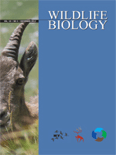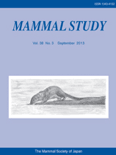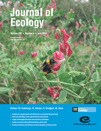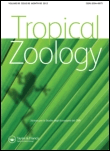
WILDLIFE BIOLOGY
Scope & Guideline
Empowering research to protect our planet's wildlife.
Introduction
Aims and Scopes
- Ecological Dynamics and Habitat Use:
Research focuses on understanding the habitat preferences and ecological interactions of various wildlife species, including studies on habitat selection, resource availability, and the effects of environmental changes. - Human-Wildlife Interactions:
The journal addresses the complexities of interactions between human populations and wildlife, including studies on conflict mitigation, the impact of human activities on wildlife behavior, and community perceptions of wildlife. - Conservation Strategies and Management Practices:
Papers often explore effective conservation strategies, population management, and the implications of different management practices on wildlife populations, aiming to inform policy and enhance conservation efforts. - Innovative Research Methodologies:
The journal highlights the use of advanced methodologies, such as DNA metabarcoding, camera trapping, and individual-based modeling, to enhance wildlife monitoring and data collection. - Behavioral Ecology and Demographic Studies:
Research includes studies on the behavioral patterns, reproductive ecology, and population dynamics of various species, contributing to a deeper understanding of wildlife biology.
Trending and Emerging
- Urban Wildlife Ecology:
Increasing research on urban wildlife dynamics highlights the importance of understanding how wildlife adapts to urban environments and interacts with human populations, driven by rapid urbanization. - Climate Change Impacts on Wildlife:
There is a growing emphasis on studying the effects of climate change on wildlife populations, including shifts in distribution, phenology, and species interactions, reflecting an urgent need for climate-responsive conservation strategies. - Technological Innovations in Wildlife Monitoring:
The use of technology, such as drones, GPS tracking, and camera traps, is rapidly advancing in wildlife research, leading to more precise data collection and monitoring of wildlife behaviors and populations. - Community-Based Conservation Approaches:
Research focusing on community involvement in conservation efforts is gaining traction, emphasizing the role of local knowledge and stakeholder engagement in successful wildlife management. - Genetic and Genomic Studies:
There is an emerging trend towards integrating genetic and genomic approaches in wildlife studies, enhancing understanding of population dynamics, conservation genetics, and species interactions.
Declining or Waning
- Traditional Game Management Practices:
There has been a noticeable decrease in studies focusing on traditional game management practices, possibly due to a growing emphasis on more holistic and integrated approaches to wildlife management that consider ecological and social dimensions. - Single-Species Focused Studies:
Research that concentrates solely on individual species without considering broader ecological contexts or interactions has become less frequent, indicating a shift toward multi-species and ecosystem-level studies. - Historical Wildlife Trends:
Papers focusing on historical comparisons of wildlife populations and trends have diminished, as contemporary research increasingly emphasizes current ecological dynamics and immediate conservation needs. - Static Habitat Models:
The reliance on static habitat models has waned in favor of dynamic modeling approaches that account for changing environmental conditions and species responses over time. - Invasive Species Impact Studies:
While still relevant, the frequency of studies examining the impacts of invasive species on local wildlife populations has decreased, suggesting a potential shift in focus toward more pressing conservation challenges.
Similar Journals

PACHYDERM
Empowering insights for the protection of majestic elephants.PACHYDERM is a reputable journal dedicated to the study and conservation of elephants, published by the esteemed IUCN-SSC Asian Elephant Specialist Group. It serves as a crucial platform for researchers, conservationists, and wildlife professionals to disseminate innovative findings and share insights into elephant ecology, behavior, and conservation strategies. Featuring an impressive scope from 2008 to 2015 and resuming from 2017 to 2023, the journal falls within the Q3 category of Animal Science and Zoology, reflecting its growing impact in the field with a Scopus rank of #367/490. Although currently not open access, PACHYDERM's content is vital for those committed to advancing our understanding and protection of these magnificent creatures. By fostering collaboration and highlighting critical research, PACHYDERM plays an integral role in promoting global awareness and conservation efforts surrounding elephants.

Asian Herpetological Research
Advancing herpetological knowledge across Asia.Asian Herpetological Research, published by SCIENCE PRESS, stands as a vital resource in the field of herpetology, focusing on the comprehensive study of amphibians and reptiles across Asia. With a distinct ISSN of 2095-0357 and an E-ISSN of 2095-0357, the journal has established itself as a leading publication since its inception in 2011, converging its contributions towards fostering knowledge until 2024. Recognized for its academic rigor, it holds a commendable Q2 quartile ranking in the 2023 categories of Animal Science and Zoology, with a significant 67th percentile placement among its peers in Scopus Rankings. Although Asian Herpetological Research is not an open-access journal, it provides essential insights for researchers, professionals, and students invested in wildlife conservation, ecological studies, and biodiversity. As the journal continues to advocate for the advancement of herpetological studies, it remains a cornerstone for scholarly dialogue and research dissemination within the vibrant scientific community of Asia.

MAMMAL STUDY
Exploring the diverse world of mammals and their ecosystems.Mammal Study, published by the Mammalogical Society of Japan, is a leading academic journal dedicated to the field of mammalogy and related biological sciences. Since its inception, it has provided a critical platform for researchers, professionals, and students to share their findings and insights into the diverse facets of mammalian biology, ecology, and conservation. The journal, with ISSN 1343-4152 and E-ISSN 1348-6160, is recognized for its rigorous peer-review process and has attained a commendable Q3 ranking in the 2023 category of Animal Science and Zoology. With an impact factor reflecting its growing influence—ranking 283 out of 490 in Scopus—we welcome contributions that advance the understanding of mammalian species and their habitats. While access to published articles is through traditional channels, the journal aims to reach an even wider audience by fostering greater awareness and appreciation for mammalian research and conservation efforts. The Mammal Study has converged years of insightful publications from 2008 to 2024, solidifying its position as a vital resource in the biological sciences.

Human-Wildlife Interactions
Championing Innovative Strategies for Wildlife Management.Human-Wildlife Interactions, published by the JACK H BERRYMAN INST, is a leading open-access journal dedicated to the critical study and understanding of the complex relationships between humans and wildlife. Launched in 2007, the journal has become a pivotal platform for researchers, practitioners, and students in the fields of ecology and conservation. It is based in the heart of ecological research at Utah State University, bringing together diverse perspectives that illuminate both the challenges and solutions associated with wildlife interactions. With an impact factor reflected in its respectable Q3 ranking in Ecology and Nature and Landscape Conservation, it demonstrates a solid contribution to these scientific domains. Researchers exploring innovative conservation strategies, wildlife management practices, and the socio-economic impacts of wildlife are encouraged to submit their studies, enhancing the journal's role in fostering dialogue and advancing knowledge in this vital area of environmental science. Accessible to a global audience, Human-Wildlife Interactions continues to promote scholarly discourse in a way that supports the sustainable coexistence of people and wildlife in our shared environments.

CALIFORNIA FISH AND GAME
Illuminating the Path for Conservation EffortsCalifornia Fish and Game is a prominent journal dedicated to the fields of Animal Science and Aquatic Science, published by the California Fish and Game Editor. With its roots extending back to 1979, the journal has served as a vital platform for disseminating research focused on the wildlife and aquatic ecosystems of California and beyond. Recognized within the Q4 quartile for both Animal Science and Zoology and Aquatic Science, it provides critical insights and scholarly contributions, despite its comparative rankings within the respective categories. The journal, with an ISSN of 0008-1078 and an E-ISSN of 2331-0405, offers an invaluable resource for researchers, professionals, and students alike, looking to deepen their understanding of California's rich biodiversity and ecological challenges. For those interested in open access options, further details can be reviewed through the journal's platform. By fostering a community of inquiry, California Fish and Game plays an essential role in advancing knowledge and conservation efforts in the fields of interest.

JOURNAL OF ECOLOGY
Discovering patterns in nature's diverse ecosystems.JOURNAL OF ECOLOGY, published by Wiley, stands as a leading publication in the field of ecology, evolution, behavior, and plant science, currently positioned in the prestigious Q1 quartile across these categories. Established in 1976, the journal has consistently provided a platform for innovative research and critical discourse related to ecological patterns, processes, and interactions. With its robust Scopus ranking—31st out of 721 in Ecology, Evolution, Behavior and Systematics, and 26th out of 516 in Plant Science—this journal notably reflects the high impact and influence of its articles in the scientific community. Although it does not offer open access options, the journal ensures comprehensive dissemination of pivotal findings to researchers, professionals, and students alike. Located in the United Kingdom at 111 River St, Hoboken, NJ, the JOURNAL OF ECOLOGY remains an essential resource for those dedicated to advancing our understanding of ecological systems and their complexities.

AUSTRALIAN JOURNAL OF ZOOLOGY
Advancing the Science of Wildlife and EcosystemsAustralian Journal of Zoology, published by CSIRO PUBLISHING, serves as a premier platform for research in the fields of animal science and zoology, with a profound commitment to advancing our understanding of wildlife and ecosystems. Featuring an ISSN of 0004-959X and an E-ISSN of 1446-5698, this esteemed journal encompasses a wide range of topics relevant to ecology, evolution, behavior, and systematics. For the year 2023, it holds a commendable Q2 ranking in both Animal Science and Zoology and Ecology, Evolution, Behavior, and Systematics, demonstrating its significant impact within the academic community. With a rich publication history spanning from 1952 to 2024, the journal caters to researchers, professionals, and students by disseminating crucial findings and methodologies that contribute to effective conservation efforts and informed ecological practices. Although not an open access journal, it continues to foster collaboration and discussion among scholars in Australia and beyond. Located in Clayton, Victoria, the journal remains dedicated to its objective of enhancing knowledge in zoological sciences and addressing vital environmental challenges.

TROPICAL ZOOLOGY
Fostering conservation knowledge in diverse habitats.TROPICAL ZOOLOGY is a prestigious academic journal dedicated to advancing knowledge and research in the fields of animal science, zoology, and ecology. Published by PAGEPRESS PUBL, this journal has been an integral part of the scientific community since its inception in 1988, providing a platform for the dissemination of innovative research and discoveries related to tropical wildlife and ecosystems. With an impact factor placing it in the Q3 category for both Animal Science and Zoology, as well as Ecology, Evolution, Behavior, and Systematics, it ranks among the noteworthy publications in these fields. Researchers, professionals, and students will find that TROPICAL ZOOLOGY is an essential resource for the latest findings, fostering a deeper understanding of biodiversity and conservation in tropical environments. The journal is based in the United Kingdom, with additional administrative support from MEDIGROUP in Italy, ensuring a broad international perspective and reach. While it does not operate under an open access model, it remains committed to high-quality peer-reviewed content that contributes significantly to the understanding of tropical ecosystems and the species that inhabit them.

ENVIRONMENTAL BIOLOGY OF FISHES
Illuminating the vital connections between fish and their habitats.ENVIRONMENTAL BIOLOGY OF FISHES, published by SPRINGER, is a premier journal in the fields of Aquatic Science and Ecology, Evolution, Behavior and Systematics. With a rich history spanning from 1976 to 2024, this esteemed journal provides a platform for groundbreaking research that addresses critical issues such as fish ecology, species behavior, and environmental influences on aquatic life. Recognized for its significant contributions, it holds a Q2 ranking in both the Aquatic Science and Ecology categories, reflecting its influence and relevancy in the academic community. The journal's focus on innovative ecological studies makes it an essential resource for researchers, professionals, and students dedicated to advancing our understanding of fish biology and the broader ecological systems of which they are a part. Although not an open-access publication, the insights and findings presented in its articles are invaluable for those engaged in the preservation and sustainable management of aquatic environments.

WILDLIFE SOCIETY BULLETIN
Empowering conservation through high-impact research.WILDLIFE SOCIETY BULLETIN is a premier publication in the field of wildlife management and conservation, published by Wiley. With an ISSN of 2328-5540, it serves as an essential resource for researchers, professionals, and students invested in advancing knowledge related to wildlife ecology, behavior, and conservation practices. Although currently not open access, the journal provides a platform for high-impact research and critical insights that contribute to the sustainable management of wildlife and their habitats. The WILDLIFE SOCIETY BULLETIN aims to foster interdisciplinary discussions and provide a vital connection between academia and practical applications, ultimately promoting a deeper understanding of wildlife conservation challenges and solutions. Located at 111 River St, Hoboken, NJ, it continues to be influential in disseminating significant findings that shape policies and practices in wildlife stewardship.